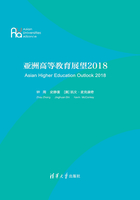
Chapter 8 Ensuring the Whole Is Greater than the Sum of Its Parts in the Asian Universities Alliance
This chapter presents a summary of the responses received to questionnaires and interviews with the representatives of AUA members.
Institutional goals and priorities in 2027: All members responded with confidence in maintaining their national standing and aspiration in becoming more internationally competitive as universities in Asia and in the world. AUA members highlighted the importance of strengthening and widening collaborations for greater regional and international flows in people, knowledge and ideas, though their priorities differ in a stronger focus on either academic mobility or research collaboration.
Internationalization: (1) a passage of initiation and a process of achieving greater commitment, capacity, and contribution in the world through institutional change and transformation; (2) a sense of purpose to forge a new identity in order to obtain membership in a closely networked international community; (3) a quality imperative for global excellence in teaching and research, and (4) a shift in the mindset of institutional governance and management to be simultaneously more outwardlooking in engagement and partnership and more willing and able to embrace selfexamination for continuous improvement.
Expected AUA's contribution to its members: (1) academic mobility for cooperation and solidarity among students, scholars and administrators in the AUA community; (2) good practices and joint innovation to facilitate the sharing of successful practices, know-how, and lessons and experiences and to create joint opportunities for facilitating innovation and policy development; and, (3) strategic dialogue and policy development to make AUA a thought leader in strategic development of higher education in Asia.
Expected AUA's contribution in Asia and the world: (1) to develop an increased capacity to operate at an Asian and international level, to access to more funding opportunities, and to enrich their portfolio of educational and academic opportunities for all members; (2) to play a proactive role in addressing global challenges to support sustainable development goals; and, (3) to improve the state of higher education and society, and to provide innovative avenues to create and extend cooperation with other regional and international higher education networks.
Measuring AUA's success in 2020: (1) quality: to evaluate how AUA support its members to achieve their own institutional goals and to enhance in external evaluations such as world university rankings; (2) connectivity: to measure the interaction among AUA members, such as academic mobility, joint educational activities, research collaboration and co-authored publication; and, (3) branding: to create a strong AUA brand that stands among major and prestigious leagues and networks of universities in the world as a pacemaker in addressing regional and global challenges.